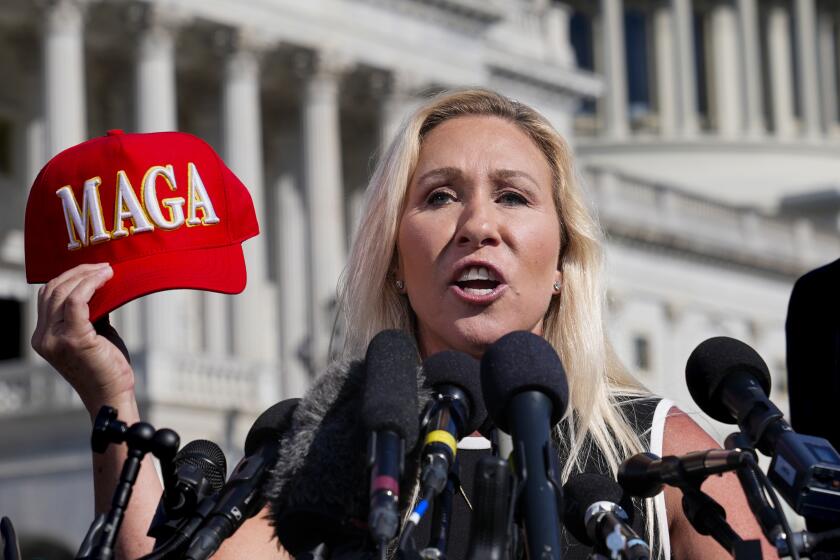Week 3: Trump hits several walls
Every presidency hits a rough patch eventually, but few have slammed into the barriers quite as early or quite as hard as the Trump administration in its third week in office.
President Trump remains popular with the voters who elected him — although numerous polls show he has not gained ground with anyone else — and that support from his base will continue to be a major asset.
But a question now looms for the president and his top aides: Do they examine how what even allies say were flaws in their decision-making led them into trouble? Or does Trump respond to frustration by going on the attack?
Good afternoon, I’m David Lauter, Washington bureau chief. Welcome to the Friday edition of our Essential Politics newsletter, in which we look at the events of the week in Washington and elsewhere in national politics and highlight some particularly insightful stories.
MULTIPLE SETBACKS
The biggest, most dramatic reversal for Trump came from the 9th Circuit Court of Appeals, which rejected his plea to put into effect his travel ban on visitors from seven mostly Muslim countries.
That fight may now move to the Supreme Court, where, as David Savage wrote, the justices might be inclined toward a compromise to avoid a 4-4 split.
It’s also possible that Trump could rewrite his executive order, which was written by top aides Stephen Miller and Steve Bannon in great haste after minimal consultation with government experts. A rewrite could fix some of the biggest weaknesses the appeals court identified in its ruling, but it would implicitly concede that the initial process was flawed.
While the court fight absorbed most of the nation’s attention, the week brought other problems:
In a late-night telephone call on Thursday, Trump gave in to pressure from Beijing and reaffirmed the longstanding “one-China” policy that the Chinese regard as an essential part of relations between the two countries.
In December, Trump had said in an interview with Fox News that “I don’t know why we have to be bound by a one-China policy unless we make a deal with China having to do with other things, including trade.”
Shortly before his inauguration, he told the Wall Street Journal that “everything is under negotiation, including one-China.”
His promise to get tough on China has been a central element of Trump’s claim that his experience as a businessman would allow him to get better deals for the U.S. than his predecessors achieved.
But China’s president, Xi Jinping, rejected negotiations over one China, and Trump climbed down. If he gained anything in return, the White House statement was silent about it.
Trump has also backed away from his previous criticism of NATO, as Bill Hennigan reported.
The moves may reflect the influence of Secretary of Defense James Mattis and Secretary of State Rex Tillerson, both of whom have been trying to reassure allies about the new administration’s plans.
OBAMACARE: MEND IT DON’T END IT?
Trump also appeared to pull back this week from his insistence on the immediate repeal of Obamacare: During an interview with Fox’s Bill O’Reilly, timed to coincide with the Super Bowl, Trump said that replacing President Obama’s healthcare law would take longer than he had thought.
“Maybe it’ll take til some time into next year,” he said. “It’s statutorily … takes a while to get. We’re going to be putting it in fairly soon,” he continued.
“I would like to say by the end of the year, at least the rudiments, but we should have something within the year and the following year.”
In his campaign, Trump said he would move to repeal Obamacare on “Day 1” of his administration. Instead, he signed an executive order that was long on rhetoric but short on specifics. Then, in his first week, he said the repeal would come “very quickly,” insisting Congress should act within weeks.
But Republicans are increasingly divided on how to proceed .
As Noam Levey reported, Republicans succeeded in confirming Trump’s nominee for secretary of Health and Human Services, Tom Price, on a party-line vote early Friday morning, but they have yet to come up with a plan for repeal.
Many GOP lawmakers now talk about “fixing” Obamacare, not repealing it. That prospect threatens mutiny from the GOP’s most ardent conservatives.
AT WAR WITH McCAIN
Overseas, the first military effort under the new administration — a Jan. 28 raid on an Al Qaeda base in Yemen — has increasingly come under criticism. The attack cost the life of one U.S. service member, killed several civilians and appears to have failed in at least some of its objectives.
As the operation’s problems became public this week, Sen. John McCain (R-Ariz.), the head of the Senate Armed Services Committee, questioned White House claims that the raid had been a “huge success.”
Trump fired back in a tweet saying McCain “Only emboldens the enemy! He’s been losing so long he doesn’t know how to win anymore.”
The exchange deepened the rift between the White House and a senior Republican senator whose help the president eventually will need.
ALL TRUMP’S TWEETS
We’re compiling everything the president has tweeted since taking office.
We’re also keeping a running list of major events in the Trump administration.
Both are great resources.
CALLING THE RUSSIANS
To add to Trump’s troubles this week, the Washington Post reported that nine current and former government officials had confirmed that Trump’s national security advisor, retired Gen. Michael Flynn, had discussed U.S. sanctions against Russia with that country’s ambassador in the final weeks of Obama’s tenure.
The FBI has been examining Flynn’s contacts with Ambassador Sergey Kislyak, the Post and others have reported. At issue is whether he tried to undermine the Obama administration’s toughening of sanctions against Moscow.
Flynn’s contacts with Kislyak may not have broken any laws; the relevant one, the Logan Act, which bars private citizens from interfering with U.S. diplomacy, is an 18th century statute that is periodically waved around as a threat, but has never been used for a prosecution.
But the Post’s account flatly contradicts Flynn’s repeated public assertions that he had not discussed sanctions with the ambassador. On Thursday, a representative for Flynn backed away from those statements, telling the Post that while Flynn “had no recollection of discussing sanctions, he couldn’t be certain that the topic never came up.”
Vice President Mike Pence had repeated Flynn’s flat denials in a television interview, and after the Post published its account, a White House official pointedly told the paper that Pence had made his statements based on what Flynn had told him.
THE PERILS OF OVERSELLING
As Noah Bierman reported, what can be a problem for Trump is the flip side of one of his strengths — his ability to reduce policy issues to a catchy, memorable phrase.
Trump’s call for a “Muslim ban” has made his executive order suspect in the eyes of federal judges. His promise to “build a wall” along the U.S.-Mexico border has raised expectations he’s not likely to meet. The same goes for his promise to immediately repeal Obamacare.
A related problem is his extreme sensitivity to criticism. That could be seen this week as Trump’s Supreme Court nominee, Judge Neil Gorsuch, tried to carefully distance himself from some of the president’s statements, only to be undermined by Trump’s tweets.
As Cathy Decker wrote, Trump has begun learning the hard way that “his inability to curb his impulses can pose a threat to his own goals.”
Meanwhile, as Lisa Mascaro reported, the partisan pressures that Trump has helped generate have continued to enflame proceedings in the Senate.
The latest example came as Majority Leader Mitch McConnell used a little-employed Senate rule to silence Sen. Elizabeth Warren during debate over Sen. Jeff Sessions’ nomination to be attorney general.
Sessions won his confirmation fight, but his problems don’t get any easier, now that he’s heading the Justice Department, Del Wilber reported.
McConnell’s move further raised Warren’s profile as a leader of the opposition to Trump. Some Democrats think that was McConnell’s goal. Warren might be too liberal to win a national election, Republican strategists believe. Of course, Democratic strategists thought Trump couldn’t win a national election, either.
GOP VERSUS CALIFORNIA
The new administration and the Republican Congress have made clear their opposition to many California policies. Now, as Evan Halper reported, they are moving quickly to bar a state effort to bolster retirement security for low-income people
In 2016, the Legislature passed a law under which low-income workers could be enrolled in state-sponsored, but privately managed, IRA accounts.
Many financial services firms oppose the idea, fearing competition from lower-fee accounts. Now the GOP plans to pass a measure that would forbid California and several other states from putting the plan into effect.
State Republicans have also asked the Trump administration to block federal money for Gov. Jerry Brown’s effort to build a high-speed rail link between Los Angeles and the Bay Area, as Ralph Vartabedian reported.
LOGISTICS
That wraps up this week. My colleague Sarah Wire will be back Monday with the weekday edition of Essential Politics. Until then, keep track of all the developments in national politics and the Trump administration with our Essential Washington blog, at our Politics page and on Twitter @latimespolitics.
Send your comments, suggestions and news tips to politics@latimes.com.
And if you like this newsletter, tell your friends to sign up.
More to Read
Get the L.A. Times Politics newsletter
Deeply reported insights into legislation, politics and policy from Sacramento, Washington and beyond. In your inbox three times per week.
You may occasionally receive promotional content from the Los Angeles Times.







